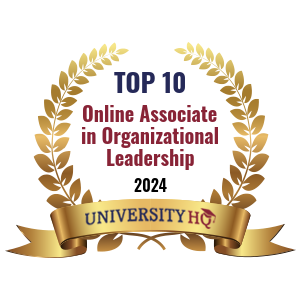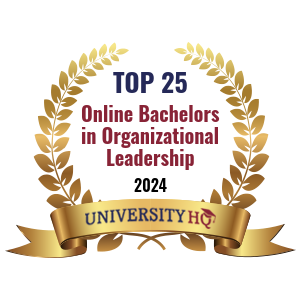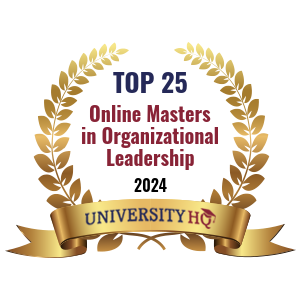What is Organizational Leadership?
An organizational leader is someone who possesses the skills, knowledge, and qualities necessary to guide and direct a group of individuals toward achieving organizational objectives. They are responsible for setting the vision, goals, and strategies of the organization, as well as motivating and inspiring team members to work toward these objectives.
An organizational leader plays an essential role in providing clear direction and purpose to their team. They must outline the organization's goals and objectives clearly to team members so that everyone works toward one common purpose, further increasing productivity and success. Because of this, effective communication is a vital skill for any organizational leader. They must be able to clearly articulate their expectations, provide feedback, and listen actively to their team members. By fostering open and honest communication, leaders can create a supportive and collaborative work environment that encourages creativity, innovation, and high performance.
Another crucial aspect of organizational leadership is the ability to make sound decisions. Leaders often face complex and challenging situations that require them to analyze information, evaluate options, and make tough choices. They must possess good judgment and be able to consider various perspectives before arriving at a decision. Moreover, they should be willing to take risks and be accountable for the outcomes of their decisions.
Building and cultivating strong relationships are also integral parts of organizational leadership. Leaders must establish trust with their team members and external stakeholders such as clients, partners, and investors - creating an atmosphere that fosters teamwork and mutual respect while creating positive interactions among all. Continuous learning and personal development are other key traits of effective organizational leaders. They must stay up to date with industry trends, technological advancements, and best practices in leadership. By enhancing their skills and knowledge, leaders can adapt to changing circumstances and ensure the success of their organization.

Featured Online Programs
Online Organizational Leadership Education in New Jersey
New Jersey is not only known for its beautiful beaches and vibrant cities but also for its strong economy and thriving business environment. As a result, the state offers numerous opportunities for organizational leadership roles. Whether you are a seasoned professional or just starting your career, New Jersey provides a favorable landscape for individuals looking to make an impact in leadership positions.
New Jersey, often referred to as the Garden State, is the fourth smallest state in the United States but has the highest population density. It is located in the Mid-Atlantic region and bordered by New York, Pennsylvania, and Delaware. With its proximity to major metropolitan areas, like New York City and Philadelphia, New Jersey is a hub for various industries including finance, technology, pharmaceuticals, and manufacturing.
In terms of employment, New Jersey boasts a robust job market. According to the US Bureau of Labor Statistics (BLS), as of May 2021, the state had a total non-farm employment of approximately 4.3 million. This includes a diverse range of industries, with the top sectors being trade, transportation, and utilities; professional and business services; education and health services; and leisure and hospitality.
As you can see, New Jersey provides many opportunities for organizational leadership across industries. If you are passionate about leading teams in finance, healthcare, or technology, New Jersey provides many positions. Key roles for organizational leadership in New Jersey include executives, managers, and supervisors responsible for overseeing teams while making strategic decisions that drive organizational success.
Individuals aspiring to organizational leadership roles in New Jersey require possessing a range of essential skills and qualities that enable them to thrive as organizational leaders such as excellent communication and interpersonal skills, the ability to effectively manage and motivate teams, strategic thinking skills, problem-solving techniques, an in-depth knowledge of their industry of interest, and the desire to continuously learn and professional develop within this dynamic field. Furthermore, continuous professional development should also be prioritized as this industry develops at an astounding rate.
Online Associates (AS)

You may find colleges and degree programs that offer an associate degree in organizational leadership or business administration, which aim to equip students with the necessary skills and knowledge to effectively lead and manage teams within various organizations. These degree programs typically cover a wide range of topics including communication, decision-making, problem-solving, team building, conflict resolution, and strategic planning. The only downside to an associate degree is that it is a shorter program, and you may not have time to go into depth on any one topic.
Students enrolled in an associate degree in this field should gain a comprehensive understanding of leadership theories and concepts. They may also develop practical skills through hands-on experiences and real-world case studies, though these aren’t available from every program. Additionally, these programs often emphasize the importance of ethical leadership practices and teach students how to navigate complex organizational dynamics.
Upon completion of an organizational leadership program, graduates can pursue various career paths such as team leader, supervisor, project manager, or entry-level management positions across different industries. The strong foundation in organizational leadership principles gained through an associate degree will also prepare individuals for higher education opportunities or further advancement in their chosen career path.
Online Bachelors (BS)

Organizational leadership colleges and degree programs offer comprehensive curriculums designed to equip students with the skills and knowledge needed to lead effectively in today's complex business environment. These programs typically cover a wide range of topics including strategic planning, team building, decision making, conflict resolution, and organizational behavior.
Students pursuing a bachelor's degree in organizational leadership can expect to gain a deep understanding of the principles and theories behind effective leadership. They should also develop practical skills through hands-on experiences such as case studies, group projects, and internships. Additionally, these programs often emphasize ethical leadership practices and encourage students to think critically about their role in shaping organizational culture.
Graduates of a bachelor's organizational leadership program will have numerous career opportunities available to them. They can pursue roles such as human resources manager, project manager, team leader, or supervisor within various industries such as healthcare, government agencies, non-profit organizations, or corporate settings. These positions require strong communication skills, the ability to motivate others, and the skill make informed decisions that align with the organization's goals and values.
Find Your Online Organizational Leadership Program
Online Masters (MS)

Organizational leadership has become a critical aspect in today's dynamic and fast-paced business environment. As a result, many colleges and universities have recognized the need for specialized education in this field and offer master's degree programs in organizational leadership or business administration, also known as an MBA program. These programs aim to equip students with the necessary knowledge and skills to effectively lead and manage organizations of various sizes across different sectors. One change at this level is that you may also be able to choose a specialization for your education, such as construction management or healthcare management.
A master's degree in organizational leadership, or an MBA program, typically covers a wide range of subjects including strategic planning, change management, team dynamics, conflict resolution, ethics, communication strategies, and employee development. Students are exposed to real-world scenarios through case studies and practical exercises that help them develop critical thinking abilities and problem-solving skills. The curriculum may also include courses on global leadership practices to prepare graduates for leading diverse teams in an increasingly globalized world.
Graduates of master's degree programs in organizational leadership can pursue various career paths within both profit-driven companies and non-profit organizations. Job prospects may include roles such as human resources manager, project manager, operations manager, executive director, or consultant. With their advanced understanding of how organizations function and their ability to lead teams effectively, these professionals play a crucial role in driving success and growth within their respective industries.
Online Doctorate (PhD)
Organizational leadership is a field of study that focuses on developing effective leaders and managers within an organization. It involves understanding the complex dynamics of organizations, including their structures, cultures, and processes. Many colleges and universities offer degree programs in organizational leadership at various levels: bachelor's, master's, and doctoral degrees.
A PhD in organizational leadership is the highest level of education one can obtain in this field. This advanced organizational leadership program typically requires several years of coursework, research, and dissertation writing for qualified students. Students pursuing a PhD in organizational leadership delve deep into topics such as leadership theories and styles, ethics and social responsibility in organizations, change management strategies, team dynamics, and strategic planning.
Earning a PhD in organizational leadership can provide access to numerous career opportunities for graduates. They may become consultants who work with organizations to improve their performance or provide executive coaching to top-level executives. Some may choose to pursue academic careers as professors or researchers in the field of organizational behavior, human resource management, or another management field. Overall, a PhD in organizational leadership equips individuals with the knowledge and skills needed to make a meaningful impact on organizations' success through effective leadership practices.
Online Certifications
Organizational leadership certifications are an excellent way for professionals to enhance their leadership skills and advance in their careers. These certifications provide individuals with proof that they have the knowledge and tools necessary to effectively lead teams and organizations. They can cover a wide range of topics including strategic planning, decision-making, team building, communication, and conflict resolution.
One benefit of earning an organizational leadership certification is increased marketability. Employers value individuals who have demonstrated expertise in leadership and are more likely to hire or promote certified professionals over others. Additionally, these certifications can open doors to new career opportunities as they validate a person's abilities to lead effectively.
Furthermore, organizational leadership certifications offer networking opportunities with other like-minded professionals. Many programs include workshops or seminars where participants can connect with industry leaders and share best practices. These connections can be valuable for future collaborations or job referrals in the field of organizational leadership. Overall, obtaining an organizational leadership certification is a worthwhile investment for anyone looking to excel as a leader within their organization or industry.
Become a Leader in New Jersey
If you are aspiring to become a leader in New Jersey, there are several key steps that you can take to achieve your goal.
-
Step 1: Earn a Degree in Organizational Leadership
To become a leader in New Jersey, it’s crucial to pursue a degree in organizational leadership from one of the many renowned colleges or universities in the state. These degree programs provide students with a solid foundation in leadership principles, communication skills, decision-making strategies, and ethical practices. By gaining theoretical knowledge and practical experience through coursework and internships, aspiring leaders can develop the necessary skills to thrive in their future roles.
-
Step 2: Enhance Your Skill Set
Apart from formal education, it is essential to continuously enhance your skill set to stand out as a leader. You could attend workshops, seminars, or conferences related to leadership development that are offered by reputable organizations or institutions in New Jersey. These events will not only expand your knowledge but also provide networking opportunities with other professionals who share similar interests. Additionally, consider joining professional associations or organizations specific to your industry where you can participate in mentorship programs and access resources that facilitate ongoing learning.
-
Step 3: Seek Leadership Roles
To gain practical experience in leadership positions, you should actively seek out opportunities within your organization or community where you can showcase your abilities as a leader. Volunteer for projects that require strong leadership skills or take on additional responsibilities at work that allow you to lead teams or initiatives. By taking on these roles and delivering results consistently, you demonstrate your potential as an effective leader and increase your chances of being considered for higher-level positions within organizations across New Jersey.
Find Online Organizational Leadership Programs
What Can I Do with a Bachelor's in Organizational Leadership?
Organizational leadership is a versatile degree that gives access to various career opportunities in many industries. With a bachelor's in organizational leadership, graduates can pursue roles such as human resources manager, training and development specialist, operations manager, project coordinator, or management consultant. These professionals play a crucial role in establishing and maintaining effective communication channels within an organization.
Furthermore, graduates with a bachelor's in organizational leadership can also explore careers in non-profit organizations or government agencies. They may work as program managers, overseeing initiatives aimed at improving the efficiency and effectiveness of these organizations. Additionally, individuals with this degree may choose to become entrepreneurs and start their own businesses or consultancies specializing in leadership development or change management.
Overall, obtaining a bachelor's degree in organizational leadership equips individuals with the knowledge and skills necessary for success across various industries. The versatility of this degree allows graduates to pursue diverse career paths while making significant contributions to the growth and success of organizations.
Potential Careers for Organizational Leadership Graduates
- Human Resource Manager:
A human resource manager is accountable for overseeing all aspects of HR within an organization: developing and implementing policies and procedures, managing employee relations, recruitment/selection, performance monitoring, compensation administration, training and development programs, as well as compliance with employment laws and regulations.
Necessary Requirements:
- Bachelor's degree in Human Resources or a related field
- Proven experience as an HR Manager or in a similar role
- In-depth knowledge of HR principles
Estimated Salary
- The median annual wage for human resources managers in the US in 2021 was $126,230
- The mean annual wage for human resources managers in New Jersey is $183,060
- Marketing Manager:
Marketing managers are charged with developing and executing strategies to promote the products or services offered by their company, creating brand recognition among customers, and increasing sales. To fulfill this role effectively, they need a blend of creativity and strategic thinking as they analyze market trends and customer insight in order to drive brand awareness.
Necessary Requirements:
- Bachelor's degree in Marketing, Business Administration, or a related field
- Proven work experience as a Marketing Manager or similar role
- Strong knowledge of marketing principles, concepts, and practices
- Excellent communication and interpersonal skills
- Ability to think creatively and strategically
- Proficient in using marketing software and analytics tools
Estimated Salary
- The mean annual wage for marketing managers in the US in 2021 was $158,280
- The mean annual wage for marketing managers in New Jersey is $184,820
- IT Director:
An IT director's role within an organization is to oversee and direct its information technology department, ensuring its smooth functioning across infrastructure, systems, and networks.
Necessary Requirements:
- Bachelor's degree in Information Technology or related field
- Proven experience in managing IT operations
Estimated Salary
- The median annual wage for computer and information systems managers in the US in 2021 was $159,010
- The mean annual wage for computer and information systems managers in New Jersey is $203,160
- Compensation Benefits and Job Analysis Manager:
A compensation benefits and job analysis manager is responsible for creating, implementing, and overseeing an organization's compensation and benefits programs, as well as conducting job analyses to establish appropriate salary ranges and classifications for employees.
Necessary Requirements:
- Bachelor's degree in Human Resources Management or related field
- Master's degree preferred
- Proven work experience in compensation management, benefits administration, or job analysis
Estimated Salary
- The mean annual wage for compensation and benefits managers in the US in 2021 was $143,140
- The mean annual wage for compensation and benefits managers in New Jersey is $183,790
- Chief Information Officer:
A chief information officer (CIO) is a senior executive responsible for leading and overseeing the organization's information technology strategy, systems, and operations. A CIO plays a crucial role in ensuring the efficient and secure utilization of technology to support the company's overall goals and objectives.
Necessary Requirements:
- Bachelor's degree in computer science, information systems, or a related field (Master's degree preferred)
Estimated Salary
- The median annual wage for chief executives in the US in 2021 was $246,440
- The mean annual wage for chief executives in New Jersey is $414,350
- Education Administrator:
Education administrators are charged with managing and overseeing daily operations of educational institutions such as schools, colleges, and universities. Their role involves performing various administrative duties while offering assistance and support to teachers, staff, and students alike.
Necessary Requirements:
- Bachelor's degree in Education Administration, Educational Leadership, or a related field (Master's degree preferred)
- Proven experience in education administration or relevant administrative roles
- Strong leadership and organizational skills
Estimated Salary
- The mean annual wage for education administrators for childcare and preschools in the US in 2021 was $57,610; those at the kindergarten-secondary earned $106,690; and those at the postsecondary level earned $115,180.
- The mean annual wage for education administrators for childcare and preschools in New Jersey is $89,350; those at the kindergarten-secondary earn $136,650; and those at the postsecondary level earn $147,980
- Non-Profit Executive Director:
Non-profit executive directors are charged with leading their organization's operations, strategic planning, and fundraising activities. Working closely with their board of directors, they must set goals that achieve strategic outcomes while overseeing staff and volunteers as they execute its mission successfully.
Necessary Requirements:
- Bachelor's degree in a relevant field (e.g., nonprofit management, business administration)
- Proven experience in a leadership role within a non-profit organization
- Strong knowledge of non-profit management principles, including strategic planning
Estimated Salary
- The median annual wage for chief executives in the US in 2021 was $246,440
- The mean annual wage for chief executives in New Jersey is $414,350
- General and Operations Manager:
As a general and operations manager, your primary responsibility will be overseeing the overall operations and daily activities of an organization. This involves making sure all departments work efficiently together towards meeting its goals and objectives.
Necessary Requirements:
- Bachelor's degree in business administration or a related field
- Proven experience as a general or operations manager, preferably in a similar industry
- Strong leadership skills
Estimated Salary
- The mean annual wage for general and operations managers in the US in 2021 was $122,860
- The mean annual wage for general and operations managers in New Jersey is $179,190
